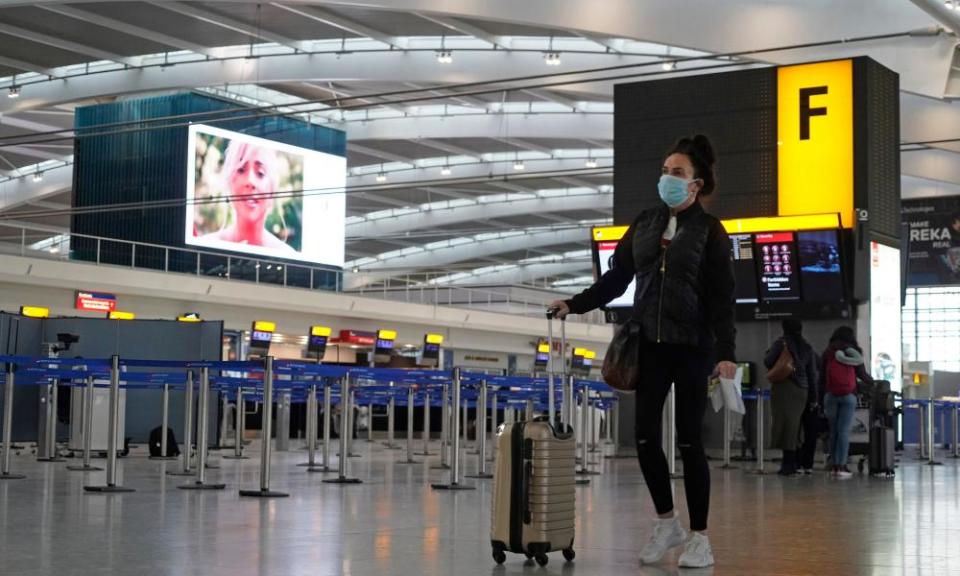Despite UK’s vaccine success, it will take time for consumer habits to return

Mothballed planes and deserted terminals tell their own story. Aviation has been one of the sectors hit hardest by the pandemic and looks like being one of the last to recover. Unless things pick up in the next six months Heathrow will see fewer passengers this year than it did in 2020.
It doesn’t come as much of a shock, therefore, to find the chief executive of the airport wondering why recovery has been so slow. And although John Holland-Kaye was talking about his own business, he might as well have been talking about the whole economy when he asked: where is the vaccine dividend?
That’s a good question. Six months ago, when the UK was mired in its winter lockdown, the government’s message was that the flying start to Britain’s vaccine programme would result in a speedier economic recovery than in rival countries.
Yet after an early burst of activity, the recent signs suggest the recovery is running out of steam. The US has regained all of the ground it lost during the pandemic, while the UK’s output is 4.5% below its pre-crisis level. Last week’s snapshots of business were stronger in the eurozone – still playing catch-up on jabs – than in the UK.
Meanwhile, the retail analysts Springboard found that footfall to shopping destinations was barely affected once consumers were legally allowed to shop without masks on 19 July. Activity was strong on “freedom day” itself but quickly fell back and over the week as a whole showed a nugatory increase on the previous seven days.
A number of factors seem to be at play. Despite the UK’s vaccine procurement success, the opening up of the economy initially took place at a relatively sedate pace. After being forced to announce a third lockdown for England earlier in the year, the government was in no hurry to cash in its dividend.
By the time the government was ready to lift all remaining restrictions there was an increase in cases caused by the Delta variant of the virus, which led to a four-week delay. Infection rates continued to go up during that period, which meant that when “freedom day” did eventually arrive it came with a health warning: be careful.
Not everyone has heeded this advice, as pictures of packed nightclubs testify. But plenty have, and it will be some time before they return to their old pre-crisis habits, including the willingness to get on a plane.
Markets wobble as China cracks down on private education
When Donald Trump was in the White House barely a day went by without the state of US-China relations moving markets. Headlines screaming “trade war looms” were the trigger for a share sell-off. When the story subsequently became “trade war averted” stocks went back up again.
Relations between Washington and Beijing are no warmer under Joe Biden than they were under Trump. If anything, the atmosphere is even frostier now and China’s latest crackdown – on its private education sector – will do nothing to help.
Beijing is being uncharacteristically naive if it thinks preventing private education companies from making profits or raising capital will solve the problem of China’s ageing population by reducing the cost of schooling.
What it will do is heighten suspicions – in the US and elsewhere – of Xi Jinping’s increasingly authoritarian regime, especially since the latest restrictions follow tighter regulations imposed on tech and on Chinese companies seeking overseas listings. According to reports, the UK government is exploring ways of removing China’s state-owned nuclear energy company from all future power plant projects.
It should come as no surprise that financial markets took a dive following Beijing’s latest announcement. China has a slowing economy, an increasingly hostile approach to foreign investors and is on a collision course with the US. It won’t be the last wobble.
Government sees Nissan as sign Brexit can work
David Cameron knew he was in big trouble on the night of the Brexit vote when Sunderland voted by 61-39% in favour of leaving the European Union.
The size of the Leave vote sent shares and the pound plunging because Sunderland is the home of the Nissan car plant, which was thought to be at risk in the event of Brexit.
Predictions that Nissan workers would quickly get “buyer’s remorse” have proved wrong, not least because for the government Nissan is a sign that Brexit can work and is therefore too big to fail. The Japanese company might well have invested £1bn in a new generation of electric cars and now announced plans to hire 400 new workers, but a large slug of state aid probably helped clinch the deal.

 Yahoo Finance
Yahoo Finance 